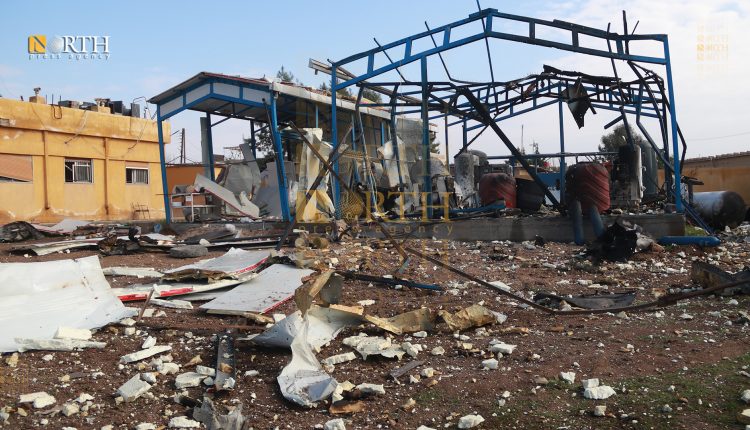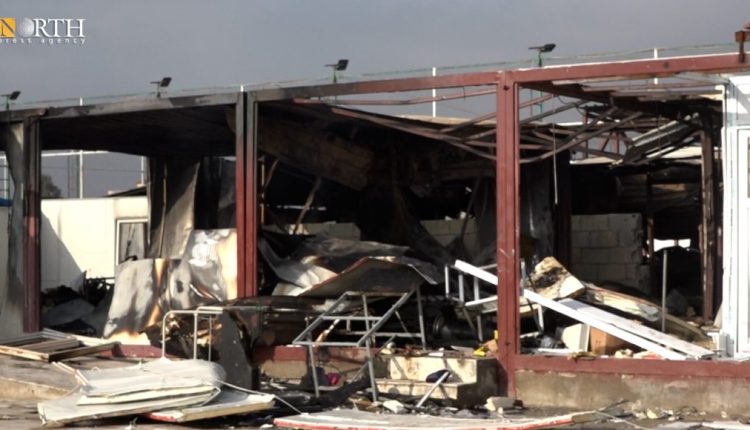QAMISHLI, Syria (North Press) – Healthcare facilities in the areas held by the Autonomous Administration of North and East Syria (AANES) are not exempt from Turkish strikes, the matter raises concerns for the population that nowhere in Northeast Syria is safe. Frequently, Turkey launches airstrikes and drone attacks against the AANES-held areas, targeting oil fields, power installations, and other facilities. This includes healthcare facilities that previously provided services for civilians.
In late 2023, Turkey targeted several vital healthcare facilities in northern Syria, including kidney dialysis center and the USAID-supported oxygen tank factory in Qamishli. The Turkish strikes also hit Meshtanour clinic in the city of Kobani, northern Syria, which is supported by Médecins du Monde (MDM) Organization and Covid-19 Hospital in the countryside of Derik (al-Malikiyah) in the far northeast Syria. Under the Geneva Convention, attacks on hospitals are strictly prohibited.
Dialysis center
On Dec.25, 2023, Turkey targeted several vital facilities in northern Syria, including the kidney dialysis center in the city of Qamishli and knocked it out of service. The significant damage inflicted on the center prevented it from resuming its services. As a result, one of the patients died.
“More than 22 kidney patients were planned to come to the center for treatment the day following the strike,” said Rafe Abbas, center’s director. “Kidney patients, in particular, cannot postpone their turn, not even for a single day, especially those with severe cases.”
Health board of the AANES stated that the center, the only one in Qamishli, used to help 100 patients with almost 250 sessions weekly. The kidney dialysis center in Qamishli, which was established by the AANES in 2021, provided free kidney dialysis services and was visited by dozens of kidney patients monthly.
The center was equipped with a specialized medical staff, six dialysis devices, blood pressure medications, diluents, analgesics and preservatives, and there was a resuscitation department, a pharmacy, and a laboratory.
The health board affiliated with the AANES is currently conducting maintenance work to resume the operations of the center and be able to receive patients.

Oxygen factory
In the same Turkish airstrike which targeted the kidney dialysis center, the oxygen factory was also destroyed since it is located in the vicinity of the center. The factory was supported by the United States Agency for International Development (USAID) and it used to meet the oxygen needs of most hospitals in Qamishli.
In October 2022, the AANES and in cooperation with BasicNeeds US company opened a new oxygen factory in the city of Qamishli, to secure oxygen for patients in all public hospitals for free and in private ones with nominal prices. The factory consists of two parts; each one could produce 150 big and medium oxygen cylinders, with 90-95% cleanness and has the capacity of accommodating 120 liter of oxygen.
Kobani’s only clinic
On Dec. 25, 2023, the Turkish bombardment targeted several sites in Kobani and its countryside, including the Meshtanour Medical Center and completely put it out of service. The clinic used to provide healthcare services for over 500 patients per day. Over 110,000 patients benefited from the center’s services every year.
Ahmad Mahmoud, Co-chair of AANES’ Health Board in Kobani, told North Press that the damage caused by the Turkish airstrikes on the center is estimated at $200,000. “It would take months, if not years, to establish a similar center and resume operations, providing services to the local population.”
The center consisted of the Outpatient Department, the Diabetic Foot Department, the Emergency Department, the Woman and Children Department, the Psychological Support Department, and the Vaccines Department which included leishmaniasis vaccines.

Covid-19 Hospital
Between Oct.5 and Oct.7 in 2023, Turkey targeted 131 sites in northeast Syria, and the Covid-19 Hospital was one of the targeted sites. The hospital that is located in Derik was completely destroyed. It consisted of four sections, two of which were designated for Covid patients, and two for suspected Covid patients, with a total of 12 rooms, each accommodating four patients until undergoing PCR testing.
All of the emergency and treatment medications for patients and medical equipment were destroyed, including monitors, nebulizers, ventilators, blood pressure monitors, oximeter devices, and mobile X-ray machines. The hospital was entirely destroyed and became a pile of rubble.

Prohibited internationally
Under the Geneva Convention, attacks on hospitals are strictly prohibited. Common Article three stipulates that in all circumstances, persons must be treated humanely and impartially and that the wounded and sick shall be collected and cared for. The customary international humanitarian law also provides special protection for hospitals, medical staffs, and healthcare workers.
The international human rights law prohibits arbitrary deprivation of freedom. The right to health, enshrined in the International Covenant on economic, social, and cultural rights, to which Syria is a party, includes an unequivocal commitment to provide healthcare facilities and access to healthcare services on a non-discriminatory basis, especially for vulnerable and marginalized groups, as stated in Article No. 14. Deliberate attacks on hospitals and places housing the wounded and sick and attacks on healthcare staffs using slogans of the Red Cross or Red Crescent constitute “a war crime in non-international armed conflicts.”
Article 18 of the Fourth Geneva Convention states, “Civilian hospitals organized to give care to the wounded and sick, the infirm and maternity cases, may in no circumstances be the object of attack, but shall at all times be respected and protected by the Parties to the conflict.”
Article 19 continues, “The protection to which civilian hospitals are entitled shall not cease unless they are used to commit, outside their humanitarian duties, acts harmful to the enemy.”
According to Article 8 of the Rome Statute of the International Criminal Court of 1998, intentionally directing attacks against civilians and hospitals is considered a war crime, unless there is evidence that they are military objectives.

